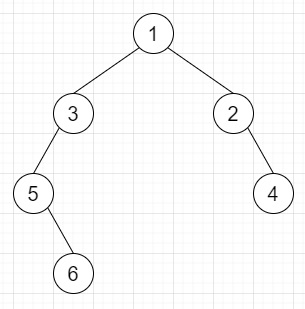
 Data Structure
Data Structure Networking
Networking RDBMS
RDBMS Operating System
Operating System Java
Java MS Excel
MS Excel iOS
iOS HTML
HTML CSS
CSS Android
Android Python
Python C Programming
C Programming C++
C++ C#
C# MongoDB
MongoDB MySQL
MySQL Javascript
Javascript PHP
PHP
- Selected Reading
- UPSC IAS Exams Notes
- Developer's Best Practices
- Questions and Answers
- Effective Resume Writing
- HR Interview Questions
- Computer Glossary
- Who is Who
Encode N-ary Tree to Binary Tree in C++
Suppose we have a N-ary tree. We have to encode that tree into one binary. We also have to make deserializer to deserialize the binary tree to N-ary tree.
So, if the input is like

then the output will be

To solve this, we will follow these steps −
Define a function encode(), this will take root,
-
if root is valid, then −
return null
node = new tree node with value of root
-
if size of children of root is not 0, then −
left of node := encode(children[0] of root)
curr = left of node
-
for initialize i := 1, when i < size of children of root, update (increase i by 1), do −
right of node := encode(children[i] of root)
curr := right of curr
return node
Define a function decode(), this will take root,
-
if root is not present, then −
return NULL
node := new node with val of root
curr := left of root
-
while curr is non-zero, do −
insert decode(curr) at the end of children of node
curr := right of curr
return node
Example
Let us see the following implementation to get a better understanding −
#include <bits/stdc++.h>
using namespace std;
class TreeNode {
public:
int val;
TreeNode *left, *right;
TreeNode(int data) {
val = data;
left = NULL;
right = NULL;
}
};
void inord(TreeNode *root) {
if (root != NULL) {
inord(root->left);
cout << root->val << " ";
inord(root->right);
}
}
class Node {
public:
int val;
vector<Node*> children;
Node() {}
Node(int _val) {
val = _val;
}
Node(int _val, vector<Node*> _children) {
val = _val;
children = _children;
}
};
string n_ary_to_str(Node *root){
string ret = "";
if(root){
ret = ret + to_string(root->val);
if(root->children.size() > 0){
ret += "[";
for(Node* child : root->children){
ret += n_ary_to_str(child) + ", ";
}
ret += "]";
}
}
return ret;
}
class Codec {
public:
TreeNode* encode(Node* root) {
if(!root) return NULL;
TreeNode* node = new TreeNode(root->val);
if(root->children.size()){
node->left = encode(root->children[0]);
}
TreeNode* curr = node->left;
for(int i = 1; i < root->children.size(); i++){
curr->right = encode(root->children[i]);
curr = curr->right;
}
return node;
}
Node* decode(TreeNode* root) {
if(!root) return NULL;
Node* node = new Node(root->val);
TreeNode* curr = root->left;
while(curr){
node->children.push_back(decode(curr));
curr = curr->right;
}
return node;
}
};
main() {
Codec ob;
Node n5(5), n6(6);
Node n3(3); n3.children.push_back(&n5); n3.children.push_back(&n6);
Node n2(2), n4(4);
Node n1(1); n1.children.push_back(&n3); n1.children.push_back(&n2);
n1.children.push_back(&n4);
cout << "Given Tree: " << n_ary_to_str(&n1) << endl;
cout << "Serialized Binary Tree: ";
TreeNode *root = ob.encode(&n1);
inord(root);
cout << endl;
Node *deser = ob.decode(root);
cout << "Deserialized Tree: " << n_ary_to_str(deser);
}
Input
Node n5(5), n6(6); Node n3(3); n3.children.push_back(&n5); n3.children.push_back(&n6); Node n2(2), n4(4); Node n1(1); n1.children.push_back(&n3); n1.children.push_back(&n2); n1.children.push_back(&n4);
Output
Given Tree: 1[3[5, 6, ], 2, 4, ] Serialized Binary Tree: 5 6 3 2 4 1 Deserialized Tree: 1[3[5, 6, ], 2, 4, ]

